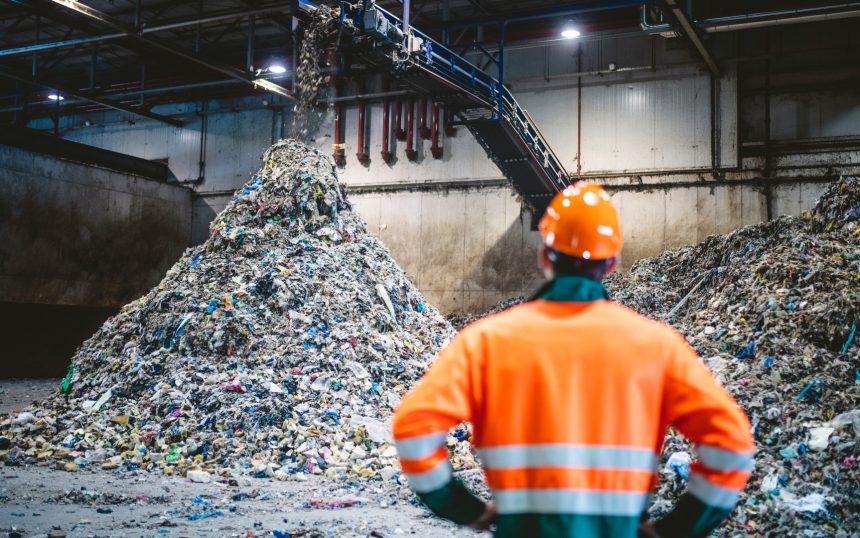How to Choose the Right Recycling Partner for Your Business

In today’s fast-evolving world, sustainability is no longer a choice but a necessity for businesses aiming to stay competitive and environmentally responsible. Recycling has become a cornerstone of sustainability, enabling companies to reduce their environmental footprint, conserve resources, and comply with ever-tightening regulations. Beyond just waste management, recycling offers businesses an opportunity to contribute to a circular economy where resources are reused and repurposed, minimizing their impact on the planet.
A reliable recycling partner plays a crucial role in this endeavor. Whether it’s managing industrial scrap, processing specialized waste like PVC, or handling aluminum and pharma waste, the right partner ensures your waste is managed efficiently, ethically, and sustainably. A trusted recycling partner brings expertise, transparency, and innovative solutions that align with your business’s recycling needs and sustainability goals.
This article delves into the essential steps for selecting the perfect recycling partner for your business. From understanding your waste management needs to assessing potential partners for compliance, capabilities, and customer support, we’ll guide you through a comprehensive approach to making an informed decision. By the end of this guide, you’ll be equipped to choose a partner that not only helps you manage waste but also strengthens your commitment to sustainability and environmental stewardship.
Understand Your Recycling Needs
Assess the Type and Volume of Waste Your Business Generates
- Manufacturing industries often deal with large amounts of industrial scrap, such as plastic, metal, or hazardous materials.
- Healthcare sectors generate pharma waste that requires specialized handling and recycling processes.
- Retail and packaging industries produce waste like cardboard, paper, and PVC materials.
Identify Specific Recycling Requirements
Not all waste is treated equally in the recycling process. Different materials require distinct recycling techniques:
- Plastic waste like PVC blister scrap must be processed carefully to ensure it’s reused effectively.
- Metal waste such as aluminum demands precise separation and smelting processes for reuse.
- E-waste requires specialized recycling to extract valuable components without causing harm to the environment.
Align Recycling Goals with Business Sustainability Objectives
- Reducing your carbon footprint by choosing partners with eco-friendly processes.
- Supporting a circular economy by ensuring materials are repurposed into new products.
- Complying with local and international regulations for waste management to uphold your business’s reputation.
By understanding your recycling needs and goals, you lay the groundwork for a successful partnership. A recycling partner must not only be able to manage your waste effectively but also align with your vision of sustainability, helping you achieve your environmental and operational targets.
Research Potential Recycling Partners
Start with Local and Regional Recycling Companies
Proximity plays a significant role in selecting a recycling partner. Local and regional recycling companies often offer several advantages:
- Reduced logistics costs: Partnering with a nearby company minimizes transportation expenses and lowers your carbon footprint.
- Faster service: A local partner can respond quickly to your collection needs, ensuring timely pickups and waste management.
- Knowledge of regional regulations: Local companies are more likely to be well-versed in specific state or city recycling laws, helping your business remain compliant.
Look for Specialized Partners Based on Your Waste Type
Recycling is not a one-size-fits-all process. Each material type requires specialized expertise and equipment to ensure efficient recycling. Look for companies that cater specifically to the materials your business generates:
- PVC Scrap Buyer: Essential for businesses producing PVC waste like blister scrap or other plastic materials.
- Aluminum Scrap Buyer: Crucial for companies dealing with metal waste to ensure proper smelting and reuse processes.
- Pharma Scrap Buyer: For healthcare-related waste, a specialized partner ensures safe and compliant recycling of sensitive materials.
- Industrial Scrap Buyer: Industries generating large volumes of mixed waste require a partner with robust facilities and handling capabilities.
Evaluate Company History, Reputation, and Expertise
- Experience: Look for companies with a proven track record in handling the type of waste your business generates. For example, a Recycling Company in India with extensive experience in industrial waste management is more likely to deliver consistent results.
- Reputation: Read customer reviews, testimonials, and case studies to understand their performance. A reliable partner will have positive feedback from businesses similar to yours.
- Expertise: Assess their capabilities in advanced recycling methods, eco-friendly practices, and compliance with environmental regulations. Companies with certifications and accreditations demonstrate their commitment to quality and sustainability.
Check Compliance and Certifications
Choosing a recycling partner that adheres to local and international standards is critical for ensuring your waste is managed responsibly and sustainably. Compliance and certifications demonstrate the partner’s commitment to ethical practices, environmental responsibility, and regulatory adherence, giving you confidence in their operations.
Ensure the Partner Complies with Local and International Recycling Regulations
Recycling regulations vary across regions and industries. It’s essential to confirm that your potential partner complies with the applicable rules, such as:
- Local regulations: These govern waste collection, segregation, and processing. For example, a Waste Management Company in Ahmedabad must follow municipal guidelines for waste handling and disposal.
- International standards: Businesses generating specialized or hazardous waste may need to comply with international frameworks, such as the Basel Convention for hazardous waste transport and disposal.
Look for Certifications and Accreditations
Certifications and accreditations are reliable indicators of a recycling partner’s commitment to quality and sustainability. Some key certifications to consider include:
ISO Standards:
- ISO 14001: Focuses on environmental management systems.
- ISO 9001: Demonstrates quality management practices.
- Environmental Permits: Valid permits confirm that the company operates legally and responsibly.
- Industry-Specific Accreditations: Certifications from recognized organizations in the recycling or waste management sector indicate expertise in handling specific types of waste, such as plastic, aluminum, or pharmaceutical materials.
Importance of Working with Ethical and Eco-Conscious Recycling Companies
- Minimize environmental impact by using advanced, eco-friendly recycling technologies.
- Contribute to the circular economy by ensuring waste materials are repurposed into valuable resources.
- Operate transparently, sharing details about their recycling processes and environmental initiatives.
Partnering with such a company reflects positively on your business’s commitment to sustainability. It strengthens your brand image as an environmentally responsible organization while helping you achieve long-term sustainability goals.
Evaluate Their Recycling Processes
The effectiveness of your recycling partnership hinges on the partner’s ability to process your waste responsibly and efficiently. Understanding their recycling methods, sustainability practices, and expertise in handling specific materials ensures they meet your expectations and align with your business’s environmental goals.
Ask for Transparency in Their Recycling Methods
Recycling methods:
- Recycling methods:
- Mechanical recycling: Commonly used for plastics, metals, and other non-hazardous materials, this process involves shredding, melting, and remolding waste into new products.
- Chemical recycling: Used for more complex materials, this method breaks down waste into its chemical components for reuse, suitable for specialized materials like PVC.
- Waste segregation: Confirm if the company has robust systems to separate recyclable materials from non-recyclables, ensuring maximum resource recovery.
- End product usage: Ask where the recycled materials go—whether they are repurposed into new products, sold to manufacturers, or used in eco-friendly initiatives.
Transparency in recycling processes is a testament to the partner’s commitment to accountability and environmental stewardship.
Ensure They Follow Environmentally Friendly and Sustainable Practices
- Energy efficiency: Do their recycling processes use energy-efficient technologies? Reducing energy consumption is vital for lowering carbon emissions.
- Waste reduction: Ensure they generate minimal waste during recycling and have strategies to manage any residual waste responsibly.
- Eco-certifications: Partners with certifications for sustainability practices, such as LEED or ISO 14001, are more likely to prioritize environmentally sound operations.
Assess Their Ability to Handle Specific Materials
- PVC Scrap Buyer: The partner should have expertise in recycling PVC materials, ensuring efficient handling and repurposing of plastic waste like blister scrap.
- Industrial Scrap Buyer: Confirm their ability to manage large-scale industrial waste, including mixed materials.
- Aluminum Scrap Buyer: Ensure they can handle metal waste with appropriate separation, smelting, and refining processes.
- Pharma Scrap Buyer: For pharmaceutical waste, the partner must adhere to strict safety and compliance standards during recycling.
By evaluating their processes and capabilities, you ensure your waste is recycled responsibly and turned into high-quality materials, reducing waste and supporting sustainability goals.
Choosing a recycling partner who excels in transparency, sustainability, and specialized recycling processes not only safeguards your waste but also enhances your company’s commitment to environmental responsibility. Let me know the next heading, and I’ll continue writing!
Review Customer Testimonials and References
Read Reviews or Case Studies from Other Businesses They Serve
Recycling methods:
- Customer satisfaction: Positive reviews often highlight the partner’s ability to meet deadlines, deliver quality service, and maintain transparency.
- Industries served: Look for case studies or testimonials from businesses in your industry. For example, if you deal with PVC or aluminum scrap, find examples of clients who had similar needs.
- Problem-solving ability: Case studies often detail challenges faced during recycling projects and how the company resolved them, showcasing their expertise and flexibility.
Request References to Verify Reliability and Professionalism
- Verify claims: Confirm that the partner has delivered on their promises in real-world scenarios.
- Assess reliability: Ask about the partner’s consistency in providing timely pickups, transparent processes, and accurate reporting.
- Gauge professionalism: Understand how the partner communicates, addresses concerns, and handles unforeseen challenges.
Importance of Choosing a Partner with a Proven Track Record
- Industry expertise: Companies with a history of working in your industry understand its specific recycling challenges and opportunities.
- Trustworthiness: A consistent record of successful projects demonstrates the partner’s commitment to delivering quality results.
- Risk reduction: Working with a reputable partner reduces the risk of service interruptions, compliance issues, or subpar recycling practices.
For example, a Scrap Buyer in India with years of experience in handling industrial waste or specialized materials like aluminum or PVC is more likely to deliver reliable and efficient services. Similarly, a Recycling Company in India with a diverse client base demonstrates versatility and adaptability.
By carefully reviewing testimonials, case studies, and references, you gain a clearer picture of how the recycling partner operates, their strengths, and their ability to align with your business needs. This due diligence is key to building a long-term partnership with a company that supports your sustainability goals and upholds your business values.
Understand Pricing and Value-Added Services
Compare Pricing Models
- Pay-per-service: This model is ideal for businesses with fluctuating waste volumes or occasional recycling needs. You pay only for the services used, providing flexibility without long-term commitments.
- Long-term contracts: For businesses with consistent recycling needs, a long-term agreement can offer cost savings through discounted rates. These contracts also provide predictability in budgeting and service continuity.
Ask About Additional Services
- Waste audits: Some recycling partners conduct comprehensive waste audits to analyze the type and quantity of waste generated. This helps in identifying areas for improvement and optimizing your recycling processes.
- Sustainability reports: Detailed reports on your recycling activities, including metrics like the amount of waste diverted from landfills and the reduction in carbon emissions, can demonstrate your company’s commitment to sustainability to stakeholders.
- Customized recycling plans: Partners who offer tailored solutions based on your industry, waste type, and business goals can provide more effective and efficient recycling services. For example, a PVC Scrap Buyer or Aluminum Scrap Buyer might offer specialized handling and processing solutions for these materials.
Consider the Cost-Benefit Ratio of Their Offerings
- Efficiency: A slightly higher cost may be justified if the partner provides faster, more efficient recycling services that reduce your operational downtime.
- Environmental impact: Companies with eco-friendly and sustainable practices might charge more, but their processes contribute significantly to your sustainability goals.
- Long-term savings: Value-added services like waste audits and sustainability reports can help reduce waste generation over time, leading to long-term cost savings.
For instance, working with a Waste Management Company in India that offers comprehensive services and sustainability insights might have a higher upfront cost but can deliver substantial environmental and financial benefits in the long run.
By carefully analyzing pricing models and evaluating the value-added services, you can choose a recycling partner that not only fits your budget but also aligns with your vision for sustainability and operational efficiency.
Align Goals and Vision
Ensure the Recycling Partner Shares Your Commitment to Sustainability
- Achieving sustainability goals: A partner who values sustainability will actively work to reduce landfill waste, maximize resource recovery, and implement eco-friendly practices.
- Reputation management: Partnering with an environmentally conscious company enhances your brand’s reputation as a responsible and forward-thinking business.
- Long-term alignment: Shared goals create a partnership rooted in mutual understanding and a commitment to making a difference.
Importance of Choosing a Partner Who Prioritizes Environmental Impact and Circular Economy Practices
- Resource recovery: Transforming waste into valuable materials ensures that resources are reused rather than discarded. For example, a PVC Scrap Buyer can repurpose plastic waste into granules for manufacturing.
- Carbon footprint reduction: Partners using energy-efficient processes or renewable energy sources contribute to reducing greenhouse gas emissions.
- Innovative recycling methods: Companies that invest in research and innovation to improve recycling efficiency are better positioned to adapt to your evolving needs.
Building a Long-Term Partnership Based on Shared Values
- Consistency and reliability: Working with a partner who understands your business needs ensures seamless operations over time.
- Strategic collaboration: Long-term partnerships enable joint efforts to innovate and improve recycling processes, such as developing customized solutions for industrial waste.
- Shared success: Aligning on sustainability goals allows both parties to celebrate milestones, such as waste reduction achievements or sustainability certifications.
For example, partnering with a Waste Management Company in Ahmedabad that values community engagement and environmental preservation fosters a relationship that benefits your business and the local ecosystem.
By aligning goals and vision, you not only ensure that your waste is managed responsibly but also establish a partnership that drives positive environmental and social outcomes. This alignment is key to building a sustainable future for your business and the planet.
Conclusion
Choosing the right recycling partner is essential for achieving your business’s sustainability goals and ensuring compliance with waste regulations. A reliable partner helps manage waste efficiently, offers customized solutions, and aligns with your environmental commitments.
By considering factors such as compliance, recycling processes, and long-term alignment, businesses can find a Recycling Company in India or a Waste Management Company in Ahmedabad that provides sustainable and cost-effective waste solutions.
Ultimately, the right recycling partner not only enhances operational efficiency but also supports your brand’s commitment to sustainability. Take the time to choose a partner that shares your vision and helps drive long-term environmental success.






